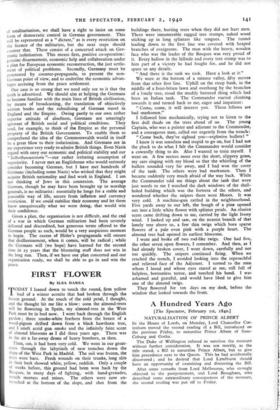FIRST FLOWER
By ILSA BAREA
T ODAY I leaned down to touch the round, firm yellow 1 bud of a winter aconite that had broken through the frozen ground. At the touch of the cold petal, I thought, and the thought hit me like a blow: soon the almond-trees will be flowering in Spain, my almond-tree in the West Park must be in bud now. I went back through the English garden ; three smoke-white feathers from the breast of a wood-pigeon drifted down from a black hawthorn tree, and I smelt acrid gun smoke and the infinitely faint scent of almond blossoms as I did three years ago. There was in the air a far-away drone of heavy bombers, as then.
Then, too, it had been very cold. We went in our great- coats through the labyrinth of new trenches down the slope of the West Park in Madrid. The soil was frozen, the trees were bare. Fresh wounds on their trunks, long slits in their bark showed white, yellow, reddish. Only a couple of weeks before, this around had been won back by the Basques, in many days of fighting, with hand-grenades, trench mortars and mines. The others were now en- trenched at the bottom of the slope, and shot from the buildings there, hurting trees when they did not hurt men. There were innumerable ragged tree stumps, naked wood sticking up in long splinters like tongues. The tunnel leading down to the first line was covered with heaped branches of evergreens. The man with the heavy, wooden face who was the leader of the Basques was very proud of it. Every hollow in the hillside and every tree stump was to him part of a victory he had fought for, and he did not spare us any details.
"And there is the tank we took. Have a look at it."
We were at the bottom of a minute valley, fifty metres from that other first line. Uphill on the steep bank, in the middle of a frost-bitten lawn and overhung by the branches of a lonely tree, stood the muddy battered thing which had been an Italian tank. The Commander started climbing towards it and turned back to me, eager and impatient: "Come, come, it will interest you. These fellows are bad marksmen."
I followed him mechanically, trying not to listen to the first dull thuds on the trees ahead of us. The young Captain, who was a painter and adjutant to the Commander, and a courageous man, called out urgently from the trench: "Come back, they've sighted you—explosive bullets! "
I knew it was senseless and stupid to go on, but I had not the pluck to do what I felt the Commander would consider a cowardly thing to do. Also I wanted to train myself. I went on. A few metres more over the short, slippery grass, my ears singing with my blood so that the whistling of the bullets sounded very far away, and I had won the cover of the tank. The others were bad marksmen. Then I became suddenly very much afraid of the way back. While the Commander told me things about the tank that were just words to me I watched the dark windows of the shell- holed building which was the fortress of the others, and wondered whether the snipers there were Moors. It was very cold. A machine-gun rattled in the neighbourhood. Five yards away to our left, the bough of a pine opened out into a little white flower with splinter petals. An elusive scent came drifting down to me, carried by the light frosty wind. I looked up and saw, on the nearest branch of that lonely tree above us, a few thin twigs which bore sparse flowers of a pale even pink with a purple heart. The almond tree had opened its earliest blossoms.
I went and broke off two rod-like twigs. One had five, the other seven open flowers, I remember. And then, as I had already broken cover, I went down, carefully and not too quickly. The snipers continued firing. When we reached the trench, I avoided looking into the reproachful and relieved face of the Adjutant. I turned to the man whom I loved and whose eyes stared at me, still full of helpless, bottomless terror, and touched his hand. I was ashamed and grateful, and would have liked to give him one of the almond twigs.
They flowered for ten days on my desk, before the window that looked towards the front.






































 Previous page
Previous page